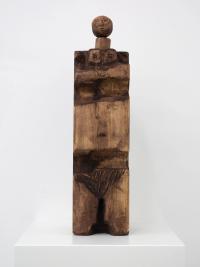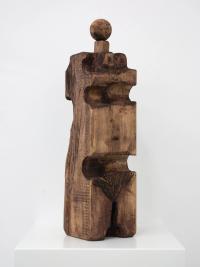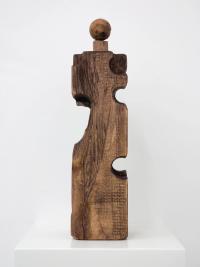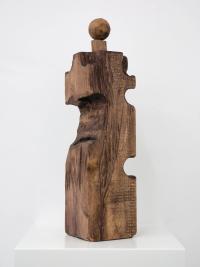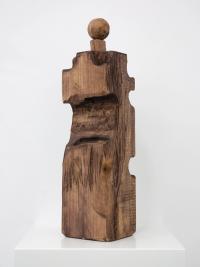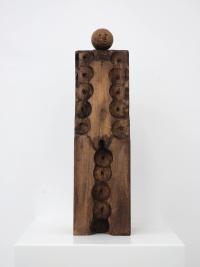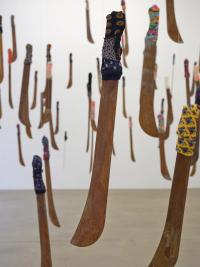Works

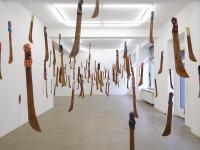
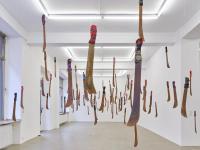
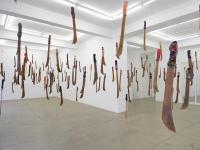


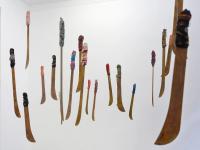
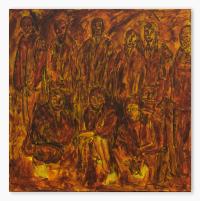
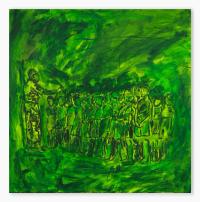
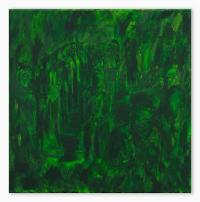
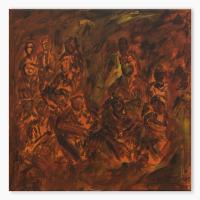
Installation Views
Press Release
Helena Uambembe
Com lábios de dizer nova poesia
Jan Kaps is pleased to present Com lábios de dizer nova poesia, Helena Uambembe’s first solo exhibition with the gallery. The title – which translates as “With lips to speak new poetry” – is drawn from Meninos do Huambo, a song by Angolan poet Manuel Rui and composer Ruy Mingas. Rui was from the city of Huambo – the root of Uambembe’s name and the birthplace of both her parents.
After fleeing the Angolan Civil War, Uambembe’s father was among the refugees conscripted into South Africa’s apartheid-era 32 Battalion (also known as Buffalo), which was based in the Caprivi Region of Namibia. Following the end of the Cold War, the battalion was relocated to Pomfret, South Africa, a decaying desert town on the edge of the Kalahari, marked by political shame and neglect. Uambembe was born and raised in this isolated, Portuguese-speaking community – a site of exile that continues to shape her exploration of forced migration, inherited trauma, and fractured belonging.
Com lábios de dizer nova poesia reflects on the 50th anniversary of Angolan independence through the interwoven histories of Uambembe’s family and South Africa’s 32 Battalion. The exhibition draws from her father’s personal archive and that of former Commanding Officer Colonel Gert Nel, whom she met in 2016. Nel shared with her a tightly controlled selection of photographs depicting life in Namibia’s Caprivi Region – almost propagandistic images that ostensibly present heroism, camaraderie, and community while obscuring the exploitation of displaced Angolans as instruments of apartheid warfare, destined to remain dislocated from their homeland. Both of Uambembe’s parents died before they could return to Angola.
The title’s reference to Huambo recalls the heart of Angolan resistance. When Meninos do Huambo was first composed in the fervor of independence, it was filled with hope – the promise of a new language, a new nation. “At the time,” Uambembe reflects, “the song spoke of possibility. Today, lips are hungry – you can’t speak out.” Fifty years on, the poet’s dream of renewal collides with a reality of inequality and unrest. Earlier this year, protests erupted across Angola in response to a sharp rise in petrol prices and worsening living conditions, only to be swiftly and violently suppressed. “It was the first time people had mobilised against the government,” Uambembe notes. “But even now, speaking out comes at a cost. Are we saying new things, or the same things over and over? A luta continua?”
At the centre of the exhibition is Palavras deste tempo sempre novo, an installation of hundreds of machetes suspended from the ceiling – a work Uambembe has developed over the past few years, now presented in its most ambitious scale. The installation’s title – which translates as Words of this ever new time – also draws from Meninos do Huambo. In Angola, as in Pomfret, the machete is an everyday tool: domestic, not inherently violent. It is the hand that wields it that determines its power. On the Angolan flag, the machete replaces the sickle – a revolutionary emblem intertwined with histories of labour and resistance. Uambembe wraps each handle in found cloth, softening its grip and personalising its form, transforming the symbol of survival and violence into one of memory and tenderness.
Surrounding Palavras deste tempo sempre novo are new paintings that fuse imagery from dreams, archives, and inherited memory. The works draw together Uambembe’s recurring dreams of Pomfret – especially vivid since relocating to Europe – with fragments from Colonel Nel’s Buffalo Base archive and her father’s own photographs. Rendered in a feverish, expressive hand, the paintings evoke both the intimacy of memory and the disquiet of historical distortion.
Also included are a series of sculptures that extend Uambembe’s ongoing exploration of form, memory, and play. Building on the body of work first introduced at Haus der Kunst following her ars viva award, carved wooden figures and assemblages carry traces of both tenderness and unease. Their shapes recall fragments of the human body as well as the improvised forms of handmade toys – objects that hold the dual charge of innocence and survival. Conceived during a period of relentless travel and reflection, the sculptures evoke the psychological and physical weight of displacement, yet also the imaginative resilience that allows new worlds to be shaped from what remains.
In Com lábios de dizer nova poesia, Uambembe speaks from the space between memory and myth, between the promise of freedom and the persistence of trauma. Her work gathers fragments of personal and national history, holding them in suspension – like stars, like machetes – awaiting new constellations of meaning, awaiting lips to speak new poetry.
